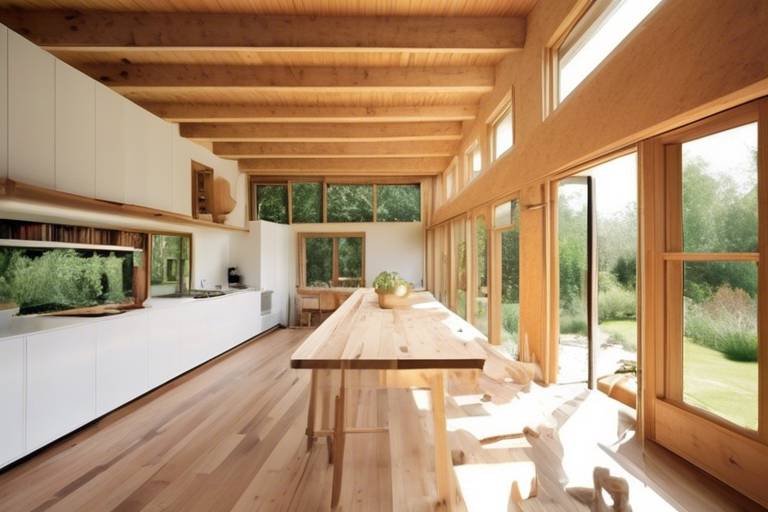The Power of Minimalism - Living with Less for a Better Planet
Minimalism is not just a trend; it's a powerful lifestyle choice that has the potential to transform our planet for the better. By living with less, we can significantly reduce waste, consumption, and our environmental footprint. Embracing minimalism means simplifying our lives, decluttering our spaces, and focusing on what truly matters. It's about quality over quantity, experiences over possessions, and mindfulness over mindless consumption.
When we choose minimalism, we are making a conscious decision to reduce our material possessions. By owning fewer things, we not only free up physical space but also mental space. This shift away from consumerism not only benefits our personal well-being but also has a positive impact on the environment. Imagine a world where we consume only what we need, where every purchase is intentional and serves a purpose.
One area where minimalism can make a significant impact is in the fashion industry. By opting for quality pieces over fast fashion trends, we can reduce textile waste and support ethical and sustainable practices. Minimalist fashion is timeless, versatile, and eco-friendly. It's about curating a wardrobe that reflects our values and lasts beyond fleeting trends.
Minimalism extends beyond our personal belongings to our living spaces. A minimalist home is designed to be functional, aesthetically pleasing, and environmentally friendly. By using sustainable materials and embracing energy-efficient design, we can create a space that nurtures both our well-being and the planet. It's about creating a sanctuary that is free from excess and clutter.
Living a minimalist lifestyle is not just about what we own; it's about how we live. By focusing on experiences, relationships, and personal growth, we can lead a more fulfilling life. Minimalism encourages us to slow down, be present, and appreciate the simple joys. It's a journey towards greater mindfulness, gratitude, and overall well-being.
Zero waste living is a core principle of minimalism. By reducing waste, recycling, composting, and minimizing single-use plastics, we can lessen our environmental impact. Minimalists strive to live sustainably, making conscious choices that benefit the planet and future generations. It's about leaving behind a legacy of stewardship and responsibility.
When we adopt mindful consumption habits, we become more intentional with our purchases. Minimalism teaches us to value quality over quantity, to buy only what we truly need, and to avoid unnecessary shopping. By promoting conscious consumerism, minimalism challenges the culture of overconsumption and waste. It's a call to action for a more sustainable and ethical way of living.
Minimalist travel is about exploring the world with intention and mindfulness. By traveling light, sustainably, and mindfully, we can minimize our carbon footprint and environmental impact. It's about immersing ourselves in new cultures, connecting with nature, and leaving a positive footprint wherever we go. Minimalist travel is an opportunity for personal growth, self-discovery, and global awareness.
By engaging with the community and advocating for environmental causes, minimalists can amplify their impact. Together, individuals who embrace minimalism can create a collective movement towards a greener and more sustainable planet. By living with less and choosing to prioritize the environment, we can inspire others to join us in creating a better world for all.

Reducing Material Possessions
Living a minimalist lifestyle involves reducing material possessions to focus on what truly matters. By decluttering and owning fewer items, individuals can experience a sense of freedom and clarity. This shift away from consumerism not only benefits personal well-being but also has a positive impact on the environment.
When we accumulate less stuff, we consume fewer resources and produce less waste. Minimalism encourages us to be more intentional with our purchases, considering quality over quantity. By investing in items that are durable and timeless, we reduce the demand for fast fashion and contribute to a more sustainable future.
Minimalist living extends beyond just decluttering physical spaces; it also influences our mindset towards possessions. Instead of chasing after the latest trends or accumulating excess belongings, minimalism encourages us to appreciate what we already have and find contentment in simplicity.
By embracing minimalism and reducing material possessions, individuals can not only create a more organized and serene living environment but also play a part in reducing their carbon footprint and overall environmental impact. It's about living with purpose and aligning our values with our actions for a better planet.

Sustainable Fashion Choices
Exploring the benefits of minimalism in reducing waste, consumption, and environmental impact. How minimalist living can lead to a more sustainable lifestyle and contribute to a healthier planet.
When it comes to sustainable fashion choices, embracing minimalism goes beyond just decluttering your wardrobe. It involves a shift in mindset towards choosing quality over quantity in clothing and accessories. By opting for timeless pieces that are well-made and durable, you not only reduce textile waste but also promote ethical and sustainable practices in the fashion industry.
Imagine your wardrobe as a curated collection of items that bring you joy and serve a purpose, rather than a chaotic jumble of trends that quickly go out of style. Minimalist fashion encourages you to invest in pieces that last, supporting brands that prioritize fair labor practices and environmentally friendly production methods.
By embracing sustainable fashion choices, you not only reduce your personal environmental footprint but also contribute to a larger movement towards a more responsible and conscious approach to clothing consumption. It's about making informed decisions that align with your values and support a healthier planet for future generations.

Minimalist Home Design
Minimalist home design embodies the essence of simplicity, functionality, and sustainability. It focuses on creating living spaces that are free from clutter, allowing room for essential items and promoting a sense of calm and tranquility. In a minimalist home, each piece of furniture and decor serves a purpose, contributing to a clean and organized environment.
When designing a minimalist home, the choice of materials plays a crucial role. Opting for sustainable materials such as bamboo, reclaimed wood, or recycled glass not only adds an eco-friendly touch but also reduces the carbon footprint of the home. These materials are not only durable but also contribute to a healthier indoor environment by minimizing the use of harmful chemicals.
Lighting is another key aspect of minimalist home design. Natural light is prioritized to create a bright and airy atmosphere, reducing the need for artificial lighting during the day. Additionally, energy-efficient lighting fixtures can be incorporated to further enhance the sustainability of the home while reducing electricity consumption.
Storage solutions are essential in minimalist home design to maintain the clean and uncluttered aesthetic. Built-in storage units, multifunctional furniture pieces, and clever organization systems help maximize space and keep belongings out of sight, contributing to a minimalist and visually appealing interior.
Minimalist home design also extends to the color palette and decor choices. Neutral colors such as white, beige, and grey are commonly used to create a sense of openness and serenity. Simple yet impactful decor elements, such as geometric shapes, natural textures, and statement pieces, can add personality to the space without overwhelming the minimalist aesthetic.
In essence, minimalist home design is about creating a harmonious living environment that promotes well-being, sustainability, and a deeper connection to the space we inhabit. By embracing simplicity and functionality in every aspect of home design, individuals can cultivate a space that not only looks beautiful but also supports a more sustainable lifestyle.

Embracing Simple Living
Embracing simple living goes beyond just decluttering physical possessions; it's a mindset that focuses on the essentials of life. By prioritizing experiences, relationships, and personal growth over material wealth, individuals can find true fulfillment and happiness. Minimalism encourages people to live intentionally and be mindful of their choices, leading to a more meaningful existence.
Imagine a life where you are not weighed down by the burden of excess stuff but instead feel light and free to pursue what truly matters to you. Simple living allows for greater clarity, creativity, and peace of mind as you remove distractions and noise from your surroundings. It's about quality over quantity, savoring the moments that bring joy and contentment.
In a world consumed by consumerism and the constant pursuit of more, embracing simplicity can be a radical act of rebellion. It challenges the status quo and questions societal norms that equate success with material wealth. By stepping off the hamster wheel of endless consumption, individuals can break free from the cycle of working to buy things they don't need.
Simple living is not about deprivation but rather about abundance in different forms. It's about enriching your life with experiences, memories, and meaningful connections rather than accumulating possessions that only provide temporary satisfaction. By letting go of the unnecessary, you make space for what truly matters, allowing room for personal growth and self-discovery.
Minimalism teaches us to appreciate the beauty in simplicity, finding joy in the little things and being grateful for what we have. It encourages a more sustainable lifestyle by reducing waste, conserving resources, and minimizing our impact on the environment. Embracing simple living is not just a personal choice; it's a powerful statement in support of a better, greener planet for future generations.

Zero Waste Living
Zero Waste Living is not just a trend but a lifestyle choice that prioritizes sustainability and environmental consciousness. It involves minimizing waste generation by rethinking consumption habits and embracing eco-friendly alternatives. By reducing single-use plastics, recycling diligently, composting organic waste, and making conscious purchasing decisions, individuals can significantly decrease their environmental footprint.
One key aspect of Zero Waste Living is the concept of the circular economy, where resources are used efficiently and waste is minimized through recycling and reusing materials. This approach not only reduces the strain on natural resources but also helps in mitigating pollution and landfill overflow. By adopting a Zero Waste lifestyle, individuals can actively contribute to the preservation of the environment for future generations.
Practicing Zero Waste Living also encourages creativity and innovation in finding sustainable solutions. From upcycling old items to repurposing packaging materials, there are endless possibilities to reduce waste and promote a circular way of living. It requires a shift in mindset from disposable convenience to long-term sustainability, but the benefits for the planet and personal satisfaction are invaluable.
Furthermore, Zero Waste Living goes beyond individual actions and extends to advocating for systemic changes in waste management and production processes. By supporting businesses that prioritize sustainability and pressuring policymakers to implement eco-friendly policies, individuals can amplify their impact and drive towards a zero-waste society collectively.

Mindful Consumption Habits
When it comes to embracing minimalism, one of the key aspects is cultivating mindful consumption habits. It's about being intentional with every purchase we make, considering the impact it has on our lives and the environment. By practicing mindful consumption, we can shift our focus from accumulating possessions to cherishing meaningful experiences and sustainable products.
Imagine walking into a store not to mindlessly browse and buy on impulse, but to carefully select items that truly add value to your life. It's about quality over quantity, choosing products that are well-made, durable, and ethically produced. By being mindful of what we buy, we can avoid falling into the trap of overconsumption and reduce our ecological footprint.
Moreover, mindful consumption extends beyond just material goods. It also involves considering the social and environmental implications of our choices. Are the products we buy supporting fair labor practices? Are they made from sustainable materials? These are the questions that a mindful consumer asks before making a purchase.
By adopting mindful consumption habits, we not only contribute to a more sustainable world but also promote conscious consumerism. It's about making informed decisions that align with our values and beliefs, rather than succumbing to the pressures of consumer culture. Minimalism encourages us to break free from the cycle of mindless consumption and embrace a more deliberate and thoughtful approach to shopping.

Minimalist Travel Experiences
Minimalist travel experiences offer a unique opportunity to explore the world while minimizing environmental impact and promoting personal growth. By traveling light and mindfully, individuals can reduce their carbon footprint and waste, contributing to a more sustainable planet. Embracing minimalist principles in travel involves prioritizing experiences over material possessions, focusing on meaningful interactions with locals, and immersing oneself in the cultural richness of each destination.
When planning minimalist travel experiences, it's essential to pack only the essentials and opt for versatile clothing items that can be mixed and matched. By choosing quality over quantity, travelers can reduce the need for excessive luggage and minimize textile waste. Additionally, selecting eco-friendly accommodation options, supporting local businesses, and using sustainable transportation methods are key aspects of minimalist travel practices.
Minimalist travelers often seek authentic and immersive experiences that connect them with nature and local communities. Whether it's hiking in remote landscapes, volunteering for environmental conservation projects, or participating in cultural exchanges, minimalist travel encourages a deeper appreciation for the world and a more conscious approach to exploration.
By embracing minimalist travel experiences, individuals not only reduce their environmental impact but also cultivate a sense of mindfulness and gratitude. Traveling with intention and purpose allows for a more meaningful connection with the places visited, fostering personal growth and a deeper understanding of global interconnectedness.

Community and Environmental Impact
Embracing minimalist living not only impacts individuals but also extends to the community and the environment at large. By advocating for environmental causes and engaging with like-minded individuals, the collective impact of minimalist living can be significant. Communities that prioritize minimalism often organize events, workshops, and initiatives that promote sustainability and eco-friendly practices.
Minimalist living encourages a shift towards more conscious and sustainable choices, inspiring others to follow suit. By reducing consumption, waste, and carbon footprint, individuals embracing minimalism contribute to a greener and healthier planet for future generations. This shared commitment to environmental impact creates a sense of unity and purpose within the community.
Through collaborative efforts, minimalists can influence policy changes, support local businesses that align with sustainable practices, and raise awareness about pressing environmental issues. By leading by example and demonstrating the positive effects of minimalism on the environment, individuals can inspire others to join the movement towards a more sustainable lifestyle.
Frequently Asked Questions
- What is minimalism and how does it benefit the environment?
Minimalism is a lifestyle that focuses on living with less, reducing clutter, and simplifying life. By embracing minimalism, individuals can reduce waste, consumption, and environmental impact. This shift towards a minimalist lifestyle can lead to a more sustainable way of living, contributing to a healthier planet by minimizing resource depletion and reducing carbon footprint.
- How can reducing material possessions positively impact the environment?
Reducing material possessions through decluttering and owning fewer items can have a positive impact on the environment in several ways. By consuming less, individuals can decrease the demand for new products, leading to lower production levels and reduced resource extraction. This, in turn, helps in conserving natural resources and reducing waste generation, ultimately benefiting the environment.
- What are some strategies for practicing zero waste living?
Practicing zero waste living involves minimizing waste generation and adopting sustainable practices to reduce environmental impact. Some strategies include avoiding single-use plastics, recycling and composting organic waste, choosing reusable products, and supporting businesses that prioritize sustainability. By implementing these strategies, individuals can significantly reduce their ecological footprint and contribute to a cleaner planet.
- How can minimalist travel contribute to environmental conservation?
Minimalist travel focuses on traveling light, sustainably, and mindfully to minimize the impact on the environment. By packing efficiently, choosing eco-friendly transportation options, and supporting local communities, minimalist travelers can reduce carbon emissions, preserve natural habitats, and promote responsible tourism. This approach to travel not only benefits the environment but also enhances cultural experiences and personal growth.



















